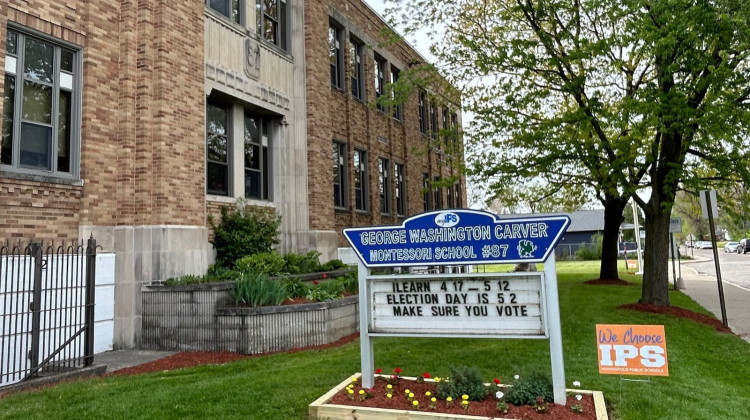
A National Institute for Early Education Research study released this week shows Indiana could do more to increase pre-K access throughout the state.
File photo: Justin Hicks / IPB NewsA new national report on preschool access shows Indiana lags behind most other states.
The National Institute for Early Education Research’s State of Preschool 2023 Yearbook ranked states based on their preschool enrollment, funding and quality.
Indiana ranks among the bottom six because the report shows it doesn’t have any state preschool programs and does not do enough to make pre-K widely available.
The report defines state preschool programs as programs that are funded, controlled and directed by the state. They must serve children around ages three to four years old, and their main focus should be centered on providing early childhood education to groups of students at least two days per week.
Indiana has no preschools that fit the report’s definition of a state-funded preschool program.
Indiana does provide On My Way Pre-K vouchers to some low-income families with four-year-olds. The state also received more than $13,000 from the federal Head Start program.
However, the report shows 85 percent of the state’s four-year-olds and 91 percent of its three-year-olds may still lack access to quality pre-K services.
Steven Barnett, founder and co-director of the National Institute for Early Education Research, said preschool can benefit children's success, health and earning potential throughout their lives. However, half of children who live in poverty across the country don’t attend preschool.
“Many more children in families above the poverty line don’t have an opportunity for preschool either because it’s not offered as a public program where they live or their families can’t afford it,” he said.
Barnett also said kids who do attend preschool might not be enrolled in quality programs.
Join the conversation and sign up for the Indiana Two-Way. Text "Indiana" to 765-275-1120. Your comments and questions in response to our weekly text help us find the answers you need on statewide issues.
The report shows that pre-K programs in only five states met all 10 of the report’s quality benchmarks. Those benchmarks include class sizes of 20 or fewer students, qualified and specialized teachers, and a supportive and culturally sensitive environment.
The report provides no analysis of how Indiana pre-K programs meet the quality benchmarks since it focuses on state preschool programs.
However, the report cited a Purdue University study that says Indiana children who use On My Way Pre-K vouchers score higher in literacy skills, school readiness and language than children from similar economic backgrounds who attended lower-quality pre-K programs.
It also says Purdue will begin a second study this fall to determine what components make up the curricula of high-quality pre-K programs in Indiana.
The Indiana Department of Education adopted early learning standards aligned to the state’s academic standards for grades K-12. The early learning standards are meant to emphasize kindergarten readiness, but they are only guidelines since the state does not currently oversee pre-K programs.
“I tend to be extremely, extremely, extremely frustrated. Over the last three years, we’ve banged ourselves over the head talking about expanding pre-K and lowering the mandatory [school] age to five,” said Sen. Fady Qaddoura (D-Indianapolis) during a Senate Appropriations Committee meeting earlier this year.
Some state lawmakers, including Qaddoura, have called on the Indiana General Assembly to fund universal pre-K. A bill that would have done so in 2023 died in its first Senate committee hearing.
Kirsten is Indiana Public Broadcasting's education reporter. Contact her at kadair@wfyi.org or follow her on Twitter at @kirsten_adair.
 DONATE
DONATE






 Support WFYI. We can't do it without you.
Support WFYI. We can't do it without you.